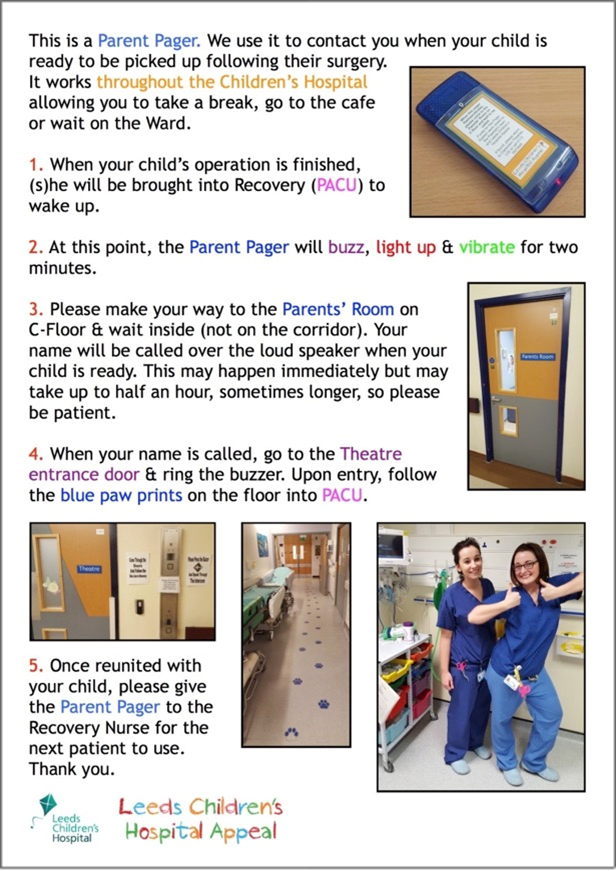Theory suggests that for Parents, the time spent waiting from their child being anaesthetised to seeing them again in Theatre Recovery is extremely stressful.
Feedback collated at the Leeds Children’s Hospital brought up themes of helplessness, isolation & anxiety & found that Parents often didn’t know what to do with themselves; whether to stay close to Theatres or whether to go for something to eat & drink (Parents are often fasting alongside their child) or whether to get some fresh air - for fear of not being in the right place at the right time.
This can be further complicated on the frequent occasions Parents have other children in tow.
The model used in Leeds until recently was to offer Parents the option of waiting in a small room adjacent to Theatre where they would be contacted by intercom once their child was recovered.
However as surgery can routinely take several hours, Recovery Nurses felt it unrealistic for Parents to wait somewhere feedback suggested was cramped, impersonal & without toilet / refreshment facilities.
Unsurprisingly, Parents often chose to wait elsewhere & consequently weren’t around when needed. Once a child’s safely recovered from their anaesthetic, what they really want is a Parent to comfort them. Any delay in reuniting the child with their Parents can be extremely distressing & prolongs discharge to the Wards, disrupting perioperative flow.
Locating missing Parents is frustrating & time-consuming & the nature of Recovery Nursing means that staff can’t leave patients to look for Parents, placing pressure on busy Ward Staff to do it.
Our idea was to implement a system to let Parents know where to be & when, giving them freedom of movement & reassurance that we would let them know their child’s operation had finished & to return to Recovery.
An initial suggestion was to use mobile phones. However issues surrounding confidentiality, safeguarding & inclusivity made their use problematic. However the biggest problem was that the Leeds Children’s Hospital is a mobile phone signal black-spot, which meant mobiles were simply too unreliable to work.
Consequently we thought to use electronic pagers of the type used in restaurants to let customers know their order’s ready.
Pagers use different signal technology to mobiles so can work where mobiles can’t & because of their simplicity, they met concerns around confidentiality, safeguarding & inclusivity. They also met Infection Control Guidelines.
Patient feedback regarding what have been christened, ‘Parent Pagers’ has been overwhelmingly positive & delays in reuniting parents with their child have been dramatically reduced.
Furthermore as a result of their implementation, Recovery staff have extended their role, now visiting children & their parents pre-operatively to distribute Parent Pagers, thereby introducing themselves & offering an opportunity to discuss the child’s perioperative journey as a further strategy to alleviate anxiety.

